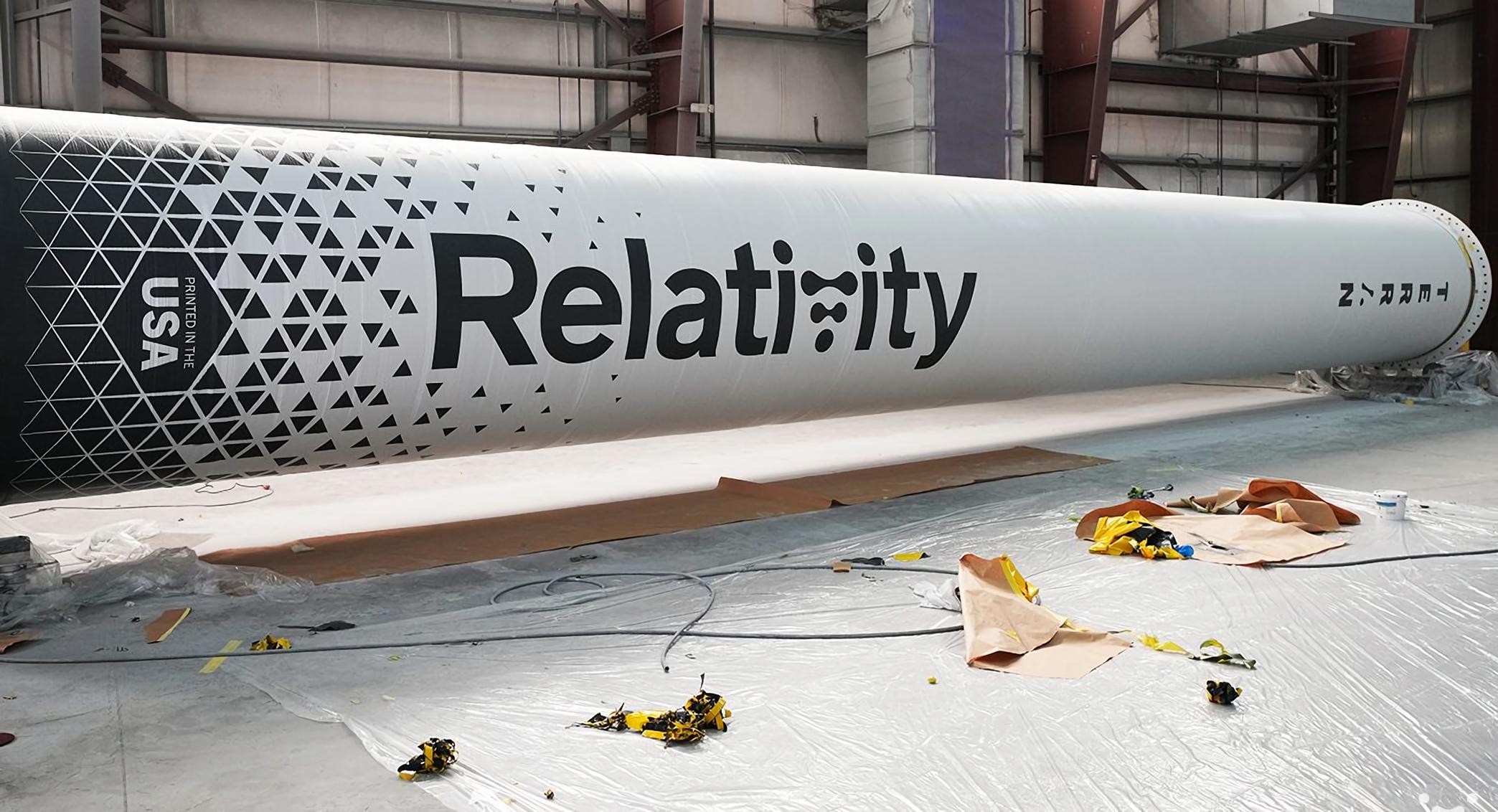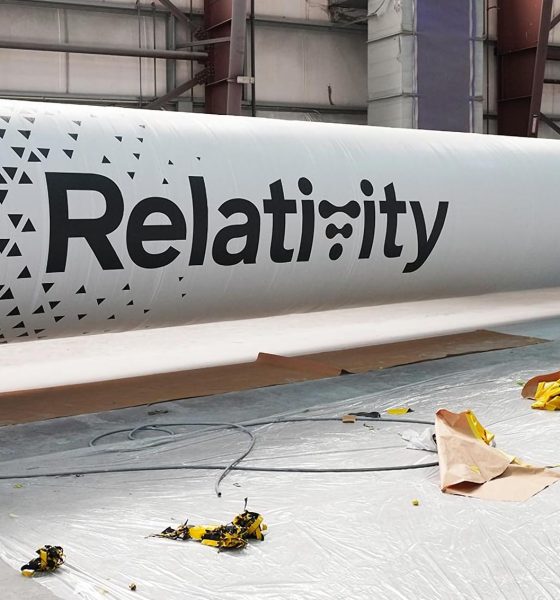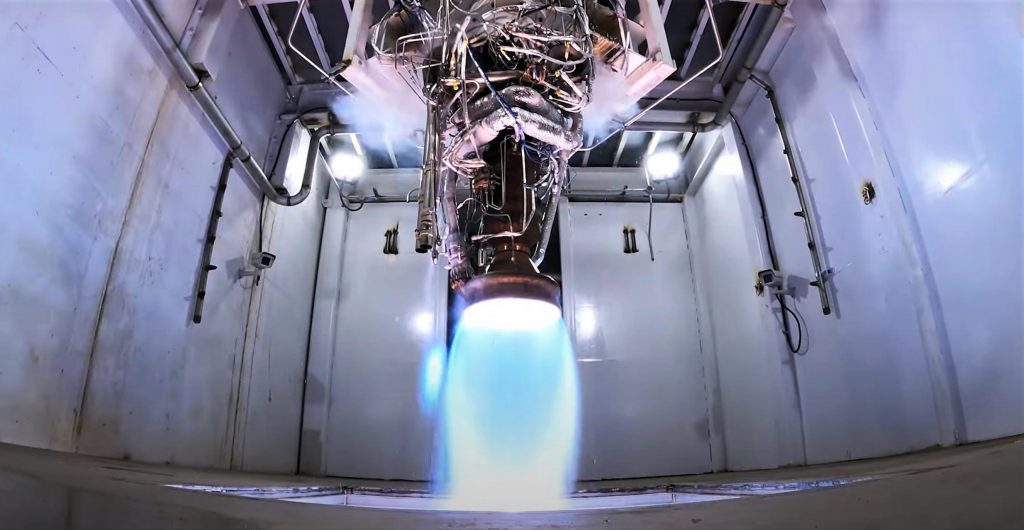

News
Relativity Space “closer and closer” to first launch of a fully 3D-printed rocket
Relativity Space, a Long Beach, California-based aerospace startup, aims to alter the manufacturing process of rockets forever by 3D-printing almost every piece of their orbital-class Terran rockets.
The company was co-founded in 2015 by CEO Tim Ellis (departing Blue Origin) and Jordan Noone (departing SpaceX), with both engineers leaving their positions at these industry giants with one goal in mind: build and launch the world’s first 3D-printed orbital rocket.
In the last two and a half years, the startup has managed to raise nearly $1.3 billion through private investors including Baillie Gifford, Blackrock, BOND, Fidelity, General Catalyst, and Mark Cuban. That amount of investment makes Relativity one of the most valuable and best-funded private aerospace companies in recent history – second only to Elon Musk’s SpaceX, which has raised more than $7.7 billion in about a decade.
Relativity’s rocket manufacturing facility, “The Factory of the Future,” is located in Long Beach, California, and is home to Stargate – the world’s largest 3D printer. According to Ellis, Stargate is capable of printing virtually all of the parts required for the world’s first 3D-printed rocket, Terran 1, and the first fully reusable 3D-printed rocket, Terran R, from raw material to flight in just 60 days. To accomplish that unprecedented feat and create the largest metallic 3D-printed structures ever attempted, Relativity has developed multiple proprietary alloys.
Beyond its extremely exotic manufacturing approach, Terran 1 is a fairly standard two-stage rocket primarily designed to launch small satellites to low Earth orbit (LEO). The first stage is powered by nine Aeon 1 engines, each producing around 23,000 pounds of force (100 kN) at launch and 25,400 lbf (113 kN) in the vacuum of space. The engine is powered by liquid methane (LCH4) and liquid oxygen (LOx) and is made out of several proprietary 3D-printed alloys. The second stage is powered by one Aeon 1 Vacuum engine capable of producing up to 28,300 lbf (126 kN) of thrust in a vacuum thanks to a much larger nozzle. Terran 1 is designed to carry up to 1,250 kilograms to a very low Earth orbit (LEO).

Relativity is growing quickly and has expanded to nearly 600 employees in just a few years. Aside from their headquarters and manufacturing facility in Long Beach, CA, Relativity has planted their flag at Cape Canaveral Space Force Station (CCSFS), where it’s developing Launch Complex 16 (LC-16) for Terran 1 and Terran R. There, a team of infrastructure engineers and technicians are currently building the launch facilities that will support Terran 1’s launch debut. A separate team at Mississippi’s NASA Stennis Space Center is continually testing the startup’s engines and rocket stages.
In a recent tweet, CEO Tim Ellis revealed that the company had completed a record nine successful Aeon engine tests in a single day. The CEO also stated that stage integration for Terran 1’s launch debut was making “amazing progress.”
Relativity had previously planned for Terran 1’s first launch to take place by the end of 2021. That debut has since slipped to “early 2022”, while the company hopes its far larger reusable Terran R rocket will debut in 2024.
Relativity was recently selected by NASA to be one of 12 companies to provide launch services for the agency’s Venture-Class Acquisition of Dedicated and Rideshare (VADR) missions, providing new opportunities for more risk-tolerant science and technology payloads and fostering a growing U.S. commercial launch market. “The VADR contract will provide a broad range of Federal Aviation Administration-licensed commercial launch services capable of delivering payloads ranging from CubeSats to Class D missions to a variety of orbits. These small satellites and Class D payloads tolerate relatively high risk and serve as an ideal platform for technical and architecture innovation, contributing to NASA’s science research and technology development.”

News
Tesla ships out update that brings massive change to two big features
“This change only updates the name of certain features and text in your vehicle,” the company wrote in Release Notes for the update, “and does not change the way your features behave.”

Tesla has shipped out an update for its vehicles that was caused specifically by a California lawsuit that threatened the company’s ability to sell cars because of how it named its driver assistance suite.
Tesla shipped out Software Update 2026.2.9 starting last week; we received it already, and it only brings a few minor changes, mostly related to how things are referenced.
“This change only updates the name of certain features and text in your vehicle,” the company wrote in Release Notes for the update, “and does not change the way your features behave.”
The following changes came to Tesla vehicles in the update:
- Navigate on Autopilot has now been renamed to Navigate on Autosteer
- FSD Computer has been renamed to AI Computer
Tesla faced a 30-day sales suspension in California after the state’s Department of Motor Vehicles stated the company had to come into compliance regarding the marketing of its automated driving features.
The agency confirmed on February 18 that it had taken a “corrective action” to resolve the issue. That corrective action was renaming certain parts of its ADAS.
Tesla discontinued its standalone Autopilot offering in January and ramped up the marketing of Full Self-Driving Supervised. Tesla had said on X that the issue with naming “was a ‘consumer protection’ order about the use of the term ‘Autopilot’ in a case where not one single customer came forward to say there’s a problem.”
This was a “consumer protection” order about the use of the term “Autopilot” in a case where not one single customer came forward to say there’s a problem.
Sales in California will continue uninterrupted.
— Tesla North America (@tesla_na) December 17, 2025
It is now compliant with the wishes of the California DMV, and we’re all dealing with it now.
This was the first primary dispute over the terminology of Full Self-Driving, but it has undergone some scrutiny at the federal level, as some government officials have claimed the suite has “deceptive” names. Previous Transportation Secretary Pete Buttigieg was one of those federal-level employees who had an issue with the names “Autopilot” and “Full Self-Driving.”
Tesla sued the California DMV over the ruling last week.
News
Tesla workers push back against Giga Berlin unionization
“IG Metall did not succeed in Giga Berlin‘s works council election earlier today. The union share was reduced from nearly 40% in 2024 to 31% in 2026! This is a clear message by the Giga Berlin team towards an independent co-determination! The list called Giga United, led by the current chairwoman, Michaela Schmitz, received the most votes with more than 40%! Good news for Giga Berlin!”

Tesla workers pushed back against unionization efforts at Gigafactory Berlin, and over the past few years, there has been a dramatic decrease in interest to unionize at the German plant.
Gigafactory Berlin Plant Manager André Thierig announced on Wednesday that IG Metall, the European union group, saw its share reduce from 40 to 31 percent in 2026 as employees eligible to vote on the issue. Instead, the Giga Berlin team, known as Giga United, received the most votes with more than 40 percent.
BREAKING! 🚨
IG Metall did not succeed in Giga Berlin‘s works council election earlier today. The union share was reduced from nearly 40% in 2024 to 31% in 2026!
This is a clear message by theGiga Berlin team towards an independent co-determination!
The list called Giga…
— André Thierig (@AndrThie) March 4, 2026
Thierig gave specific details in a post on X:
“IG Metall did not succeed in Giga Berlin‘s works council election earlier today. The union share was reduced from nearly 40% in 2024 to 31% in 2026! This is a clear message by the Giga Berlin team towards an independent co-determination! The list called Giga United, led by the current chairwoman, Michaela Schmitz, received the most votes with more than 40%! Good news for Giga Berlin!”
There were over 10,700 total employees who were eligible to vote, with 87 percent of them turning out to cast what they wanted. There were three key outcomes: Giga United, IG Metall, and other notable groups, with the most popular being the Polish Initiative.
The 37-seat council remains dominated by non-unionized representatives, preserving Giga Berlin as Germany’s only major auto plant without a collective bargaining agreement.
Thierig and Tesla framed the outcome as employee support for an “independent, flexible, and unbureaucratic” future, enabling acceleration on projects like potential expansions or new models. IG Metall expressed disappointment, accusing management of intimidation tactics and an “unfair” campaign.
The first election of this nature happened back in 2022. In 2024, IG Metall emerged as the largest single faction with 39.4 percent, but non-union lists coalesced for a majority.
But this year was different. There was some extra tension at Giga Berlin this year, as just two weeks ago, an IG Metall rep was accused by Tesla of secretly recording a council meeting. The group countersued for defamation.
Tesla Giga Berlin plant manager faces defamation probe after IG Metall union complaint
This result from the 2026 vote reinforced Tesla’s model of direct employee-management alignment over traditional German union structures, amid ongoing debates about working conditions. IG Metall views it as a setback but continues advocacy. Tesla sees it as validation of its approach in a competitive EV market.
This outcome may influence future labor dynamics at Giga Berlin, including any revival of expansion plans or product lines, which Musk has talked about recently.
News
SpaceX President Gwynne Shotwell details xAI power pledge at White House event
The commitment was announced during an event with United States President Donald Trump.

SpaceX President Gwynne Shotwell stated that xAI will develop 1.2 gigawatts of power at its Memphis-area AI supercomputer site as part of the White House’s new “Ratepayer Protection Pledge.”
The commitment was announced during an event with United States President Donald Trump.
During the White House event, Shotwell stated that xAI’s AI data center near Memphis would include a major energy installation designed to support the facility’s power needs.
“As you know, xAI builds huge supercomputers and data centers and we build them fast. Currently, we’re building one on the Tennessee-Mississippi state line. As part of today’s commitment, we will take extensive additional steps to continue to reduce the costs of electricity for our neighbors…
“xAI will therefore commit to develop 1.2 GW of power as our supercomputer’s primary power source. That will be for every additional data center as well. We will expand what is already the largest global Megapack power installation in the world,” Shotwell said.
She added that the system would provide significant backup power capacity.
“The installation will provide enough backup power to power the city of Memphis, and more than sufficient energy to power the town of Southaven, Mississippi where the data center resides. We will build new substations and invest in electrical infrastructure to provide stability to the area’s grid.”
Shotwell also noted that xAI will be supporting the area’s water supply as well.
“We haven’t talked about it yet, but this is actually quite important. We will build state-of-the-art water recycling plants that will protect approximately 4.7 billion gallons of water from the Memphis aquifer each year. And we will employ thousands of American workers from around the city of Memphis on both sides of the TN-MS border,” she noted.
The Ratepayer Protection Pledge was introduced as part of the federal government’s effort to address concerns about rising electricity costs tied to large AI data centers, as noted in an Insider report. Under the agreement, companies developing major AI infrastructure projects committed to covering their own power generation needs and avoiding additional costs for local ratepayers.








